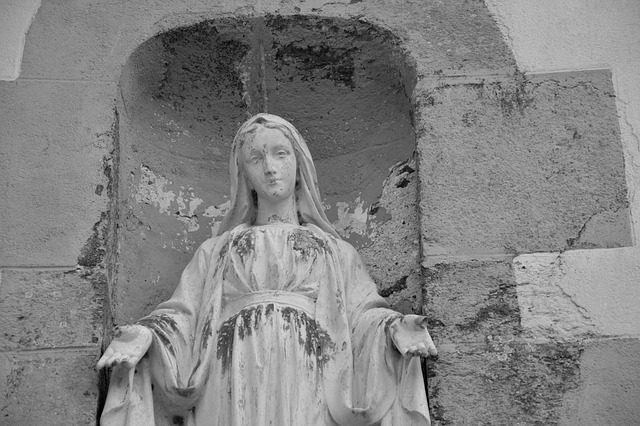
There was a stone in my pocket.
I kept forgetting it was there.
Several weeks ago now, when Rosie and I went grocery shopping, I found one of those hand-painted rocks that some people scatter around for an art project as if that isn’t littering. This one was stuffed in the fencing around the old DiGregory’s Nursery; I found it because it was right next to my usual parking spot at the end of the grocery store lot. The stone was naturally slightly heart shaped, so the artist had painted it red and put LOVE on it in white.
There aren’t many pretty things in town. I was glad to find a pretty rock. I put it in the pocket of my black hoodie, the dollar store hoodie I despise, the one I was only wearing because it was too warm for my coat but too cold for my lighter clothes. When I got home, I tossed the hoodie with the rock onto the coat pile with my purse, and forgot about it.
The next time it was too chilly for just my light clothes, I grabbed the despised hoodie. I felt the stone in my pocket, bouncing against my leg as I zipped it up, and it cheered me for a moment. This was the day after my menacing neighbor had one of her outbursts, and I was afraid to walk out of my own house. I thought she might run outside in her bathrobe and block me from getting in the house again. Having a rock in my pocket made me feel like David going out to meet Goliath. I don’t think I could ever throw a rock at a human being, but it was nice to feel one when I crammed my hands in my pockets. I could walk past Goliath’s house without fear– even when her German shepherd barked at me.
For weeks, I kept my hand on the rock as I went for my dreary walks around LaBelle and grocery shopped with my stuffy mask on. And every time I took off the hoodie, I promptly forgot it. And I did the same thing on the next chilly day, and the one after that.
Today I brought the rock to Mass.
It was raining cats and dogs in Steubenville– that relentless, icy cold rain that’s more proper to May than March. I’d woken up at seven in the morning to the sound of leaden drops beating the roof and Goliath the neighbor grumbling in it. And then I couldn’t get back to sleep. It was Mother’s Day and I hate Mother’s Day. I haven’t seen my own mother since Rosie was six months old, by her choice. I have been struggling with infertility since Rosie was a toddler and every month seems like a little failure. I don’t want to think about motherhood.
I waited to see if the rain would let up before Mass, because I hate driving in the rain, but it didn’t.
I didn’t bother to put together a church outfit. I was too depressed. I put on slacks and a sweater, and a brown and gold beanie to cover my PCOS bald spots instead of a pretty hair wrap. At the last minute I put on that hoodie– the rock bounced against my leg as I zipped it up.
I drove up Sunset Boulevard to Mass, blasting the car’s heat as if it was the middle of winter. When we got to church, it was so crowded that we had to stay with the social distancing overflow crowd in the basement.
One of the hymns was a Marian hymn, of course, since it’s May. It happened to be one I remember very well. It was a simple song Sister Mary Thomasina made us memorize back in Kindergarten, the last good year of my life, before my mother fell in with that mad spiritually abusive nun I refer to as “Sister Angeline” and my family descended into the Charismatic Renewal and Apparition Culture. We sang it during the May Crowning procession; it was my job to hold up a stick of forsythia at the same time as all the other children, to make a tunnel for the prettiest girl to walk through bearing a pillow with a wildflower crown for Mary on it. I remember singing “Near thee Madonna, gently we hover, trusting thy gentle care to prove,” imitating Sister Mary Thomasina’s nasal, atonal voice instead of the actual melody, and having no idea what those syllables meant. My classmates thought we were singing about the pop star.
I remembered loving the Virgin Mary.
I remembered kneeling before another statue of her, after my mother had bawled me out for being a burden who sucked the life out of her, and begging her to be my mother instead. I remembered cutting ties with my earthly family and praying to Mother Mary that it would somehow be all right. I remember the Faith Household known as Totus Tuus Maria accepting me and promising me that they were my family now and Mary was my real mother; telling me that I was to tell them everything and hold no part of my story back, that I was to ask for whatever I needed so they could be my sisters and help me. I remembered the spiritually abusive coordinator betraying my confidences and bullying me. I remembered the priest in charge of Households bawling me out for sharing with Totus Tuus when asked to. I remembered being thrown out of the household and ordered not to come back. I remembered getting pregnant, praying to Mother Mary to make me safe and happy in the pregnancy. And then the night Rosie was born, the medical neglect and abuse by the con artist midwife, the birth rape, screaming to Jesus and Mother Mary to at least let me black out, but she didn’t.
I started to cry, messily, into my cloth mask, until it was such a sodden mess I couldn’t breathe.
There’s a stack of disposable masks in the little room near the bathroom in the upstairs part of the church, so I ran to get one.
The architecture of that building is such that you have to completely leave the building and walk up an external staircase by the parking lot to get into the upper floor. I went out into the rain and dropped my mask, sobbing. Then I sobbed again, because I saw a big red SUV with bumper stickers plastered all over the back and sides like a quilt. A good half of the bumper stickers were against abortion or exhorting the reader to pray the Rosary, and the other half were all for handguns: ads for gun stores, drawings of pistols, boasts that only guns could protect against totalitarianism. I recognized that car. That car belonged to the sole recruit to the religious order Sister Angeline founded. Michael jokingly calls it “The Sisters of Bang Bang Shoot ‘Em Up.” The bishop dissolved that hateful religious order and Sister Angeline is in a nursing home, but this woman still lives in their failed mother house.
She was somewhere in the church, at Mass.
I might be standing a few feet from her and not know it.
I started to cry harder.
I almost did not go back into the building at all; I thought about stranding Michael and Rosie and driving home to hide.
Somehow, I ducked into the church and into the little room. I put on the fresh mask and discarded my ruined one.
There is a plaque on the wall of that room, just above the table with the masks, depicting the face of the Virgin Mary from Michelangelo’s Pieta.
I gazed at the Mother of all the living, and she gazed at me.
I gazed until it was time to receive Holy Communion; then I went back to pray in the little room, so as not to get soaked in the parking lot again.
The music switched from “O Lord I Am Not Worthy” to a setting of the Magnificat I used to sing when I went to Franciscan University. I know all the harmonies by heart. I began singing along the alto line, mechanically, gazing at the Pieta plaque, breathing the taste of the low-gluten Host into my mask.
Somehow, just then, it occurred to me how helpless Mary was when she proclaimed the words of the Magnificat.
Imagine: the lowest rung of that brutal society. A brown-skinned Jew in an occupied territory of the Roman empire. An unmarried girl away from her parents in a patriarchy. An only child in a culture that regarded many children as a sign of Divine favor. A child raised to be a servant in the temple, and then she turned up pregnant with no explanation that made sense. The usual punishment for being that person was to be stoned to death.
I snuggled into my black hoodie, and squeezed that painted rock again.
Mary ran out to the countryside to meet her cousin, the only person who could possibly understand, and this is the canticle of hope that burst out of her: My soul proclaims the greatness of the Lord, my spirit rejoices in God my Savior, for he has looked with favor on his lowly servant. From this day all generations will call me blessed: the Almighty has done great things for me, and holy is his Name. He has mercy on those who fear him in every generation. He has shown the strength of his arm, he has scattered the proud in their conceit. He has cast down the mighty from their thrones, and has lifted up the lowly. He has filled the hungry with good things, and the rich he has sent away empty. He has come to the help of his servant Israel for he remembered his promise of mercy, the promise he made to our fathers, to Abraham and his children forever.
A teenage girl as helpless and scared as I am, but in much worse circumstances, looked at Saint Elizabeth through her tears, and those were the words the Holy Spirit prompted her to say.
The Church has been singing them ever since.
I somehow felt like the older woman of the two– as if I were Saint Elizabeth, as if I ought to console that heartbroken teenager and say something. But I didn’t have anything to say to Mary. I never feel that I do.
When Mass was ended, I went outside into the rain. I tried not to look at the hateful car. I walked toward Michael and Rosie, who were already in the parking lot.
There was a white plaster statue of Mary nearby, with a crown of faded flowers on her head and vases of roses at her feet. Some other group of children had had a May Crowning recently, just like the one I’d put on with Sister Mary Thomasina’s class.
I pulled the rock out of my pocket– a heart of stone, cold, heavy, red, LOVE painted across it in big block letters. Just the thing to keep in your pocket to make you feel brave, or in case you have to fight a giant.
I left the painted heart as an offering with the flowers.
Perhaps she can do something with that.
Image via Pixabay
Mary Pezzulo is the author of Meditations on the Way of the Cross and Stumbling into Grace: How We Meet God in Tiny Works of Mercy.
Steel Magnificat operates almost entirely on tips. To tip the author, visit our donate page.













